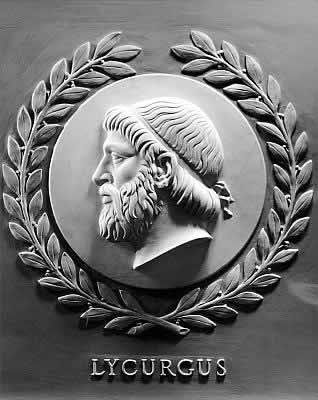
Lycurgus marble bas-relief, one of 23 reliefs of great historical lawgivers in the chamber of the U.S. House of Representatives in the United States Capitol / Relieve de Licurgo en mármol, uno de los 23 relieves de los legisladores más importantes de la historia que están en la Cámara de USA. Casa de los Representantes en el Capitolio de USA.
The term Gerontology was coined and added to the international scientific vocabulary in 1903 by Dr. Michel Elie Metchnikoff (1845-1916), Russian sociologist and biologist, successor of Pasteur. The etymology of the word comes from Greek, "geron" = old and "logos" = study. One of the most used words from the root "geron" in Ancient Greece was "gerontocracy", which referred to the government led by the elderly. In Sparta, 800 BC, the Geronts were a council of 28 men older than 60 years chosen by "meritocracy", the most prestigious were recognized for their merits highlighting as prudence, moderation, wisdom and military capability. Their performance was unquestionable and the appointment was for whole life. Along with the two kings they conformed the Gerousia (from ancient Greek "Geronti") or Council of Elders; and all together with People's Assembly ruled the city-state. Through this government system, established by Lycurgus, the Spartans tried to use elderly experience for people’s benefit. The Geronts had the mission of acting as consultants, participate in ruling the city-state as well as propose and elaborate the new laws in the legislature. Also, they were involved in the Supreme Court decisions of death sentences or loss of citizenship, and even had the power of censoring the Kings. The Geronts determined when popular decisions were made wrong and played a significance role in mediating issues between the monarchy and people, applying their wisdom and fair approach when needed. They helped to establish a city-state balance by supporting king’s decisions or governor´s wills.
Nowadays gerontology recapitulates the meaning of the Geronts by focusing on the multidisciplinary study of aging through its various branches, including sociology, psychology and biology of aging or biogerontology, with the aim of investigating the different aspects that influence and are influenced by aging. Taken together, these studies contribute in the development of strategies that promote physically and mentally healthy living in the growing group of older adults, as well as keeping them active and integrated into the society.
El término gerontología fue acuñado e incorporado al vocabulary científico internacional en 1903 por el doctor Michel Elie Metchnikoff (1845-1916) sociólogo y biólogo ruso, sucesor de Pasteur. El origen etimológico de gerontología proviene del griego, "geron" = viejo y "logos" = estudio. Una de las palabras más usadas procedentes de la raíz "geron" en la Grecia Antigua, fue "gerontocracia" la cual se refería al gobierno dirigido por los ancianos. En Esparta, 800 a. C., los Gerontes eran un consejo de 28 hombres que pasaban de los 60 años, elegidos por “meritocracia”, se reconocia a los miembros más prestigiados que destacaban por sus meritos como prudencia, moderación, buen juicio y capacidad militar. Su desempeño era incuestionable y su nombramiento vitalicio. Estos junto con los dos reyes formaban la Gerusia (del griego antiguo “gerontia”) o Consejo de Ancianos, y todos en conjunto con una Asamblea Popular gobernaban la Ciudad-Estado. Con este sistema de gobierno, creado por Licurgo, los espartanos pretendian utilizar la experiencia de los ancianos para beneficiar al pueblo. Los Gerontes tenían la misión de actuar como consultores, participar en gobernar el estado, asi como proponer y elaborar las nuevas leyes. Además, formaban parte del las discusiones sobre pena de muerte o pérdida de ciudadanía en el tribunal supremo e incluso tenían atribuciones para censurar a los reyes. Los ancianos también determinaban cuando el pueblo se había equivocado. La trascendencia de la función de los gerontes era la de mediar los asuntos entre la monarquía y el pueblo, aplicando su sabiduría y justo criterio cuando el caso lo ameritaba. Por medio del apoyo a las decisiones de los reyes o a la voluntad de los gobernados, se establecía el equilibrio en la Ciudad–Estado.
En la actualidad la gerontología recapitula el significado de geronte al enfocarse al estudio multidisciplinario del envejecimiento a través de sus diferentes ramas que incluyen la sociología, la psicología y la biología del envejecimiento o biogerontología, con el objetivo de conocer los diferentes aspectos que influyen y son influidos por el envejecimiento. El conjunto de estos estudios promueven el desarrollo de estrategias para que el creciente grupo de adultos mayores vivan sanos física y mentalmente y se mantengan activos y participativos en la sociedad.
Contributed by Judy Campos / Contribución de Judy Campos
Harvard Classics por gyrovague
Textos sobre la Agogé espartana
Osvaldo Prieto Ramos. Gerontología y Geriatría. Breve resumen histórico
No comments:
Post a Comment